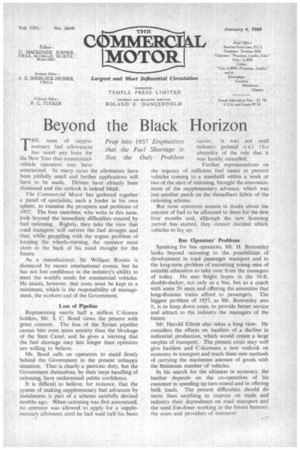Beyond the Black Horizon
Page 35

If you've noticed an error in this article please click here to report it so we can fix it.
THE issue of supplementary fuel allowances has razed any hope for the New Year that commercialvehicle operators may. have entertained. In many cases the allotments have been pitifully small and further applications will have to be made, Drivers have already been dismissed and the outlook is indeed bleak.
The Commercial Motor has gathered together a panel of specialists, each a leader in his own sphere, to examine the prospects and problems of 1957. The four members, who write in this issue, look beyond the immediate difficulties created by fuel rationing., Rightly, they take the view that road transport will survive the fuel drought and that, while grappling with the urgent problem of keeping the wheels turning, the operator must store in the back of his mind thought for the future.
As a manufacturer, Sir William Rootes is dismayed by recent international events, but he has not lost confidence in the industry's ability to meet the world% needs for commercial vehicles. He insists, however, that costs must be kept to a minimum, which is the responsibility of management, the workers and of the Government.
Loss of Pipeline Representing nearly half a million C-licence holders, Mr. S. C. Bond views the present with great concern. The loss of the Syrian pipeline causes him even more anxiety than the blockage of the Suez Canal, and he gives a warning that the fuel shortage may last longer than optimists are willing to believe.
Mr. Bond calls on operators to stand firmly behind the. Government in the present unhappy situation. That is clearly a patriotic duty, but the Government themselves, by their inept handling of rationing, have undermined public Confidence.
It is difficult to believe, for instance, that the system of making supplementary fuel advances by instalments is part of a scheme carefully devised months ago. When rationing was first announced, no operator was allowed to apply for a supplementaey allotment until he had used half his basic ration. Ii was not until industry pointed out the absurdity of the rule that it was hastily cancelled.
Further. repreSentations on the urgency of sufficient fuel issues Lb prevent vehicles corning to a standstill within a week or two of the start of rationing, brought the announcement of the supplementary advance, which was just another patch on the threadbare fabric of the rationing scheme.
But most operators remain in doubt about the amount of fuel to be allocated to them for the first four months and, although the new licensing period has started, they cannot decided which vehicles to lay up.
Bus Operators' Problems' Speaking for bus operators, Mr. H. Bottomley looks beyond rationing to the possibilities of development, in road passenger transport and to the long-term problem of recruiting young men of suitable education to take over from the managers of today. He sees bright hopes in the 30-ft. double-decker, not only as a bus, but as a coach with some 50 seats and offering the amenities that long-distance trains afford to passengers. The biggest problem of 1957, as Mr. Bottomley sees it, is to keep down costs, to provide better service and attract to the industry the managers of the future.
Mr. Harold Elliott also takes a long view. He considers the effects on hauliers of a decline in industrial production, which would create a large surplus of transport. The present crisis may well give hauliers and C-licensees a new outlook on economy in transport and teach them new methods of carrying the maximum amount of goods with the 'Minimum number of vehicles.
in his search for the ultimate in economy, the haulier depends an the co-operation of his customer in speeding Up turn-round and in offering bulk loads. The present difficulties should do more than anything to impress on trade and industry their dependence on road transport and the need foakcloser working in the future between the users and providers of transport.








































































































